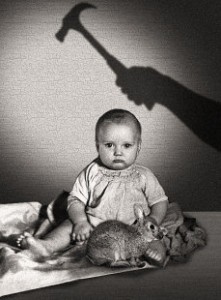The Bobo Doll represents the fall..
Albert Bandura constructed a study in the early 1960s that sought to understand the importance of learned behavior. He studied how children behaved after they had watched an adult act aggressively towards the Bobo doll. The experiment was one that supported his social learning theory and it showed that people can learn not only from being rewarded or punished themselves, but also by observing others who are either rewarded or punished. With this he went on to see that most of the children, after seeing the adults act aggressively towards the doll, would act similarly towards the doll. When they were not allowed to play with the toys they took out their anger on the doll. They would use physical force against it both through their own strength and through the objects they had access to while also verbally abusing it, like they had observed the adults doing. These results had setbacks, like many other studies, but are simply interesting and alarming. This shows how influenced we are by the observations we make. Unconsciously we are adapt to act in certain ways, or change certain things about ourselves because of the ways we see others act. Not only do we learn from our own personal experiences, we learn from observing the experiences of others. We are always observing and aware of our surroundings even if we do not do so intentionally, so the people we surround ourselves with actually does make a difference.
Relating this experiment to the four branches of theology, I can see how it fits into the category of the fall. The child has learned response, but anger came naturally. There are powerful and destructive emotions that were brought out in this experiment, simply because these children saw the appropriate aspect of their use. When they saw the adults acting in these violent ways, the children had no boundary to where their aggression stopped. As we saw from the results, the children that were subject to violence acted accordingly. I feel like this natural anger is related to the fall of man. We were made to live together in peace and love, and our passions are supposed to be used for the bettering of each other’s lives, and for bringing the kingdom of heaven to earth. Unfortunately, this passion and built up energy can easily be channeled through anger and violence, which is what we need restoration from. We are not supposed to live with these emotions, but in love. That is why this experiment shows our fall, because we can easily be led astray just by observing the actions of others. Thankfully, we can be positively influenced by observing others as well. That is why living in a community of people who are loving is crucial to personal growth. These positive actions become learned responses because not only do we try to do them on our own, we observe others setting an example for us and their actions naturally become our own responses.


